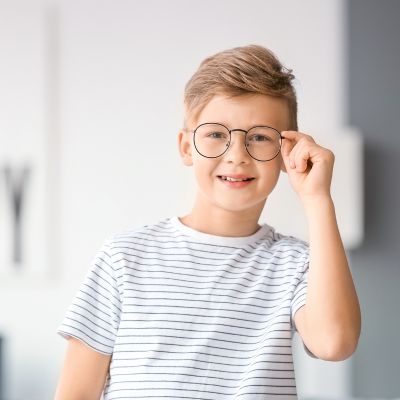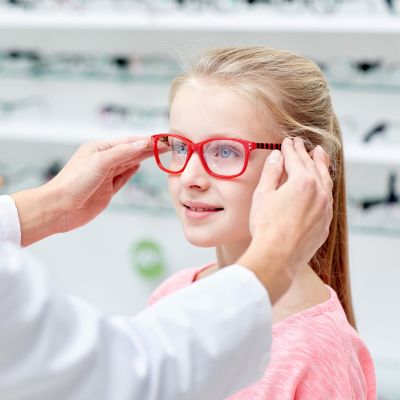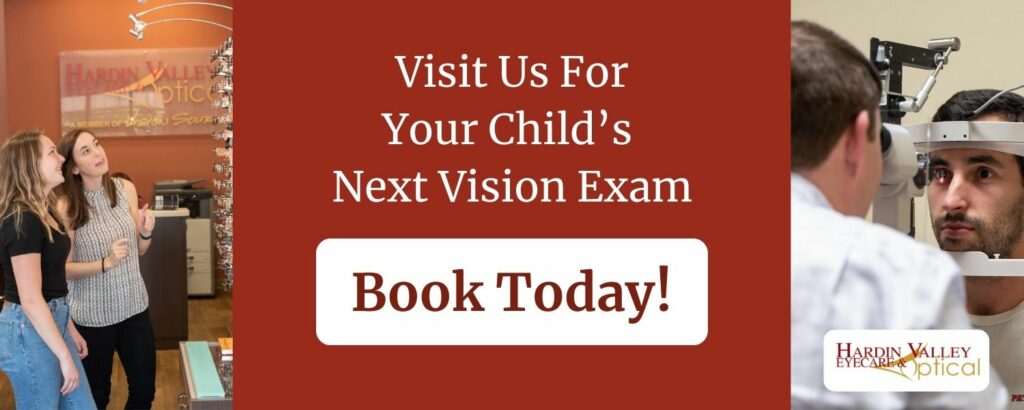As back-to-school preparations begin, it’s essential to prioritize your child’s eye health. Clear vision is crucial for their academic success, affecting reading, writing, and overall learning. A back-to-school eye exam, especially at the start of a new school year, helps ensure your child can perform their best in school.
Vision problems affect how children interact socially, impacting their ability to see the whiteboard, play sports, and engage with peers. Annual eye exams catch issues early, ensuring children excel academically and socially. Signs such as squinting, headaches, and difficulty focusing signal the need for timely back-to-school exams, essential for prompt treatment and improved vision and confidence.
Why Eye Exams are Important for Children
Eye exams are crucial for children because vision plays a vital role in learning and development. Around 80% of what children learn in school is through visual means, making clear vision essential for reading, writing, and comprehending information.
According to the American Optometric Association, one in four school-aged children has an undiagnosed vision problem. These undetected issues can significantly impact academic performance, leading to difficulties in:
- Reading
- Concentrating
- Following along in class
Vision problems can affect social interactions, as children may struggle to see the board, participate in sports, or engage in activities with peers. Early detection through regular eye exams ensures that vision issues are addressed promptly, allowing your child to perform their best academically and socially.
Signs that Your Child Needs a Back-to-School Eye Exam
There are several signs that your child needs a back-to-school eye exam. Squinting frequently is a common sign. Your child may also often complain of headaches, especially after reading or doing work up close. In these instances, they might be experiencing eye strain. Difficulty reading or focusing on distant objects, such as the board at school, is another red flag.
Behavioral indicators include avoiding reading or using a finger to track words while reading. For instance, a child who frequently rubs their eyes and avoids homework may be struggling with vision problems. A back-to-school eye exam identifies issues and helps them get treatment. Once corrected, the child’s reading skills and confidence can soar.
What to Expect During a Children’s Eye Exam
Children’s comprehensive eye exams are designed to assess various aspects of their vision and eye health. It typically includes visual acuity tests, where the child reads letters from a chart to determine clarity of vision. Eye alignment checks are performed to ensure the eyes work together properly and are not misaligned. A comprehensive eye exam involves examining the internal and external structures of the eyes to detect any abnormalities or conditions.
The exam usually takes about 30 to 45 minutes. To prepare your child, explain that the doctor will use special tools to look at their eyes and that it won’t hurt. Encourage them to ask questions and stay relaxed. Eye exams are safe and non-invasive with procedures being painless and designed to be comfortable for children.
The optometrist may use eye drops to dilate the pupils for a better view, but this is harmless and temporary. Regularly scheduled eye exams are essential for maintaining good vision and eye health in children.
The Benefits of Early Detection and Treatment
Early detection of vision problems is crucial for your child since it can prevent more serious issues from developing later on. Identifying and addressing problems such as nearsightedness, farsightedness, or astigmatism early on can avert complications like amblyopia (lazy eye) or strabismus (crossed eyes), which can lead to long-term vision impairment if left untreated.
Corrective measures, such as glasses, can significantly enhance your child’s vision and, consequently, their learning and daily activities. Glasses allow your child to see clearly, improving their academic performance and boosting their confidence in social interactions.
Contacts, and especially daily contact lenses, can be a good option—but only for older children. They offer a wider field of vision and are particularly useful for sports. But it’s important for your child to be old enough to properly care for their contacts responsibly.
Both options can boost a child’s confidence and academic performance by eliminating visual barriers. By detecting and treating vision problems early, children can experience better overall development, making regular eye exams a vital part of their healthcare routine.
How Often Children Should Get Eye Exams
Between 3 and 5 years old is the perfect time to schedule your child’s first eye exam. It allows their optometrist to catch risk factors or signs of pediatric eye problems and address them quickly. The American Optometric Association recommends annual exams from the first grade onward in most cases.
More frequent visits may be required based on your child’s individual needs and family history. A family history of vision problems, those who wear glasses or contacts, or those with diagnosed eye conditions may require more frequent visits to monitor and manage their vision health effectively.
Do you need to schedule a children’s eye exam in Knoxville, TN? Contact us today to schedule your appointment!
Vision problems impact how children interact socially, impairing their ability to see clearly, engage in sports, and connect with peers. Annual eye exams identify issues early, supporting children’s achievements in school and social environments. Signs such as squinting, headaches, and difficulty focusing underscore the necessity of timely back-to-school exams, pivotal for early intervention and improving vision and confidence.
Hardin Valley Eyecare & Optical has been serving Knoxville since 2009. Located at 10904 Spring Bluff Way, you can schedule an appointment online or call us at (865) 888-0892.






